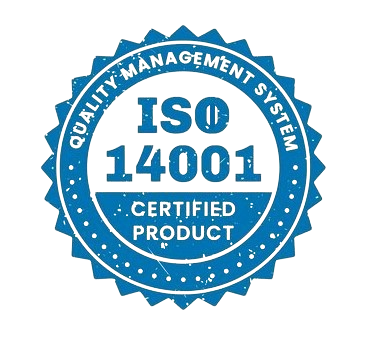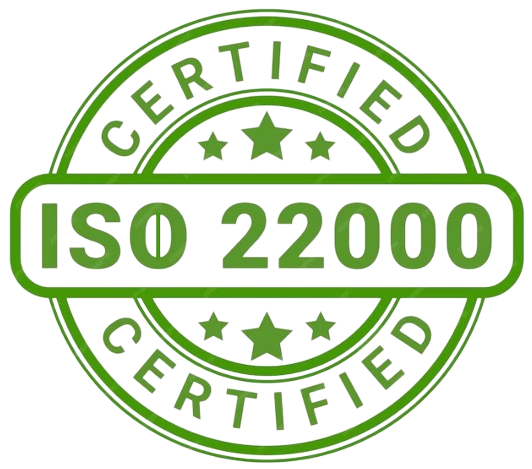ISΦ 9001 : 2015
ISΦ 9001 certification guarantees that an organizations Quality
Management System is effectively implemented
and maintained.
ISΦ 9001:2015 Standard comprises primary
clauses, each addressing
essential aspects of quality management within an organization.
- Context of the organization
- Leadership
- Planning
- Support
- Operation
- Performance evaluation
- Improvement
ADVANTAGES OF ATTAINING ISΦ 9001
CERTIFICATION
- Transparency
- Accountability
- Quick information retrieval
- System oriented & person independent
- Customer Satisfaction.
- International Recognition
- Defines responsibility for all employees & puts business on auto
- Pilot mode
- Reduce customer complaints and rejection
- Consistency in product and service
- Compliance with Regulatory requirements.
- Enhancement in the competence level of Employee
ISΦ 14001: 2015
ISΦ 14001:2015, an international standard for Environmental
Management
Systems (EMS), applies to organizations of all sizes and industries, including Rolling Mills, Steel
Plants,
Hospitals, Paper Mills, Medical Devices, and Health Care facilities in England. It outlines the
requirements
for establishing and maintaining an effective EMS to manage environmental impacts.
Advantages of ISΦ 14001:2015
- Improved environmental performance led by top management commitment
- Cost savings can be achieved through improved efficiencies in energy and water usage and
through waste minimisation
- Reduced risk of pollution incidents and other releases to the environment and therefore
avoidance of unnecessary clean up costs and/or enforcement action by regulatory bodies
- Compliance with legislation
- Reduced risk of non-compliance with legislation and subsequent costs/prosecution
- Improved brand image as customers will see an organisation that is in control of its impact
on the environment
- Improved business focus and communication of environmental issues
- Improved profitability through costs reductions and improved customer satisfaction.
ISΦ 45001:2018
ISΦ 45001 sets a structured approach for overseeing the prevention
of
work-related injuries, illnesses, and fatalities. Its aim is to enhance and ensure a secure and healthy
work
environment for employees and any other individuals engaging with the organization.
Advantages of ISΦ 45001:2018
-
Globalization: ISΦ 45001 puts your organization in an elite
category of
businesses, as it is an internationally recognized standard.
-
Improvement in business performance: The implementation of an
Occupational
Health and Safety Management System based on ISΦ 45001 reduces workplace illnesses and
injuries, and, in turn, increases productivity.
-
Best practice creation: It provides consistency and establishes
“best practices”
for occupational health and safety throughout the organization.
-
Hazard & risk identification: Conducting risk assessments in a
systematic
manner, improve the quality of the assessment.
-
Lower insurance premiums: Having a recognized system in place
provides an apron
for attracting lower insurance premiums.
-
Improvements in efficiency: The implementation of an OH&S
Management System
contributes to the reduction of accident rates, absenteeism levels, and downtime, all of
which improve the efficiency levels of internal operations.
-
Establishment of a safe working environment: Promotes the
safety of all persons
being affected by the organizations activities.
-
Focus: A culture that focuses on the “prevention of problems”
rather than on the
“detection of problems” is much more effective and rewarding to employees.
-
Continual improvement: Encourages continual improvement, e.g.
the adoption of
the “zero accident” concept.
ISΦ 22000
A Food Safety Management System (FSMS) is a proactive strategy
implemented by organizations to detect, prevent, and mitigate food-borne hazards from entering the food
supply chain, thereby enhancing the organizations food safety standards. ISΦ 22000 serves as a
risk-based management solution specifically tailored for the food industry to ensure the safety of food
intended for human consumption.
Advantages of ISΦ 22000
- Reduction in food safety incidents and cost.
- Compliance with legal and Codex HACCP principle.
- Lower risk of liability.
- Fewer errors and customer complaints.
- Continual improvement in products & processes.
- Resource optimization – internally and along the food chain.
- Sustainable food safety performance.
- Improves consumer / supplier /regulator confidence and relationships.
- Competitive advantage in the marketplace.
- Promotes international trade.
- Improved overall performance.
ISΦ 27001:2013
The ISΦ 27001:2013 standard employs a process-oriented
approach to
establish, implement, operate, monitor, review, maintain, and enhance an organizations information
security management system.
The standard encompasses a holistic perspective on
information
security, covering a wide array of assets requiring protection, including digital data, physical
documents, and technological infrastructure such as computers and networks, as well as the knowledge
possessed by individual employees. Areas of concern span from fostering the skill development of staff
to implementing technical measures to safeguard against computer fraud.
ISΦ 27001 aids in safeguarding your
information based on the following principles:
- Confidentiality ensures that information is accessible only to those authorized to have
access.
- Integrity safeguards the accuracy and completeness of information and processing methods.
- Availability ensures that authorized users have access to information and associated assets
when required.
Obtaining ISΦ 27001 certification
demonstrates that a business has:
- Protected information from getting into unauthorised hands
- Ensured information is accurate and can only be modified by authorised users
- Assessed the risks and mitigated the impact of a breach
- Been independently assessed to an international standard based on industry best practices
The domains of ISΦ /IEC 27001 typically
include:
- Security policy
- Organization of information security
- Asset management
- Human resources security
- Physical and environmental security
- Communications and operations management
- Access control
- Information systems acquisition, development, and maintenance
- Information security incident management
- Business continuity management
- Compliance
Advantages of ISΦ 27001:2013 include:
- Increased reliability and security of systems and information
- Improved customer and business partner confidence
- Increased business resilience
- Alignment with customer requirements
- Improved management processes and integration with corporate risk strategies




